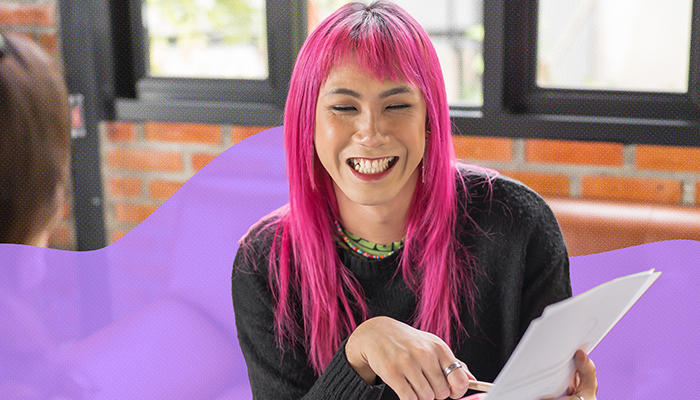When I talk to River, they’ve just finished up the final day of their fellowship program with the Sundance Institute. Their face is glowing from the Los Angeles sun streaming in through their apartment, but there’s something else, a bright energy radiating from them. I can feel it through my laptop screen.
Alongside River, five other trans filmmakers of color were selected for the Trans Possibilities Intensive created by Moi Santos of the Sundance Institute to foster “a space where trans people can see themselves and the possibilities of fully realizing their cinematic expressions into reality”, says River as they turn side to side in their rolling chair, golden snake earrings swaying above their shoulders like two emblems of wisdom. Over three days, the fellows enrolled in masterclasses about writing and conceptualizing their projects for specific audiences. They also had a day of one-on-one sessions with mentors such as Tourmaline, Sam Feder, Yance Ford, and Ro Haber, who read the fellows’ scripts and provided feedback.
It’s rare for these types of spaces to exist in the film industry that’s crowded with white, cisgender men. Trans representation on-screen has been slowly improving, but mostly through independent filmmakers like River and their cohort of fellows. Last year there was not a single transgender or non-binary character in any of the movies released by major studios, according to the most recent report from GLAAD. This was the fourth year in a row where Hollywood’s major studios failed to include trans and non-binary characters in their films, which makes programs like the one from Sundance so critical in nurturing the next generation of storytellers.
In light of the recent events with Netflix airing Dave Chappelle’s comedy special, it’s critical to interrogate the role of media representation for marginalized communities. A widely known comedian joking about the fact that he’s “team TERF” and “gender is a fact” impacts how millions of viewers see trans people and the gender binary. It’s moments like this when the lack of authentic representation of gender non-conforming people in the media becomes glaringly obvious.
We caught up with River about their fellowship experience and how it influenced their creative perspective. We also chatted about their film Ponyboi, the first narrative film that was created by and stars an intersex person, and their wellness routines that keep them grounded so that they can do their best work for themselves and ultimately for their community.
Q: I would love to hear about the Trans Possibilities Intensive program that you were a part of. What was that like?
The first day I didn’t have makeup on and it just felt like I was around family and didn’t need to present in any other way than how I showed up that day. It reminded me of the freedom and liberation that is found when you’re amongst trans and non-binary people. It’s a rare opportunity to feel so comfortable—like you’re speaking the same language and on the same wavelength.
Something that was beautiful was what Tourmaline, the visual artist and all-around amazing human being and filmmaker, said to me earlier today. She told me about setting parameters on what feedback you’re available to and not available to, especially when dealing with people who are cis and don’t understand our experiences quite as well.
In a screenplay, there are certain things a trans person will understand that other people won’t. But that gap is not a problem that needs to be filled. It’s an opportunity for both trans and non-binary people and cis people and allies to come together and discover new versions of ourselves or new concepts that were not available to us.
In that unknowing space is a place of infinite potential.
Q: It sounds like there was a lot of liberation that was gained from being in this program. How did stripping away all of those performative elements, be it through makeup or artistic expression, change your creative process?
It changed my perspective on how I approach my work. I look at it now not through the eyes of what needs to be improved, but instead, from the perspective of how much more fun can I have or how much more can I uplift in this process. How much more of myself can I pour into this and not hold back? Really allowing myself on the page as a screenwriter.
Now, if I need to just lay down on the floor, and I’ve said this in many interviews, I just lay on the floor. A lot can be solved when you just do nothing.
Q: It’s a super vulnerable practice to put all of yourself on paper because then everyone is seeing you for all of you. I’m sure your film Ponyboi was similar in terms of showing your fullness, and you acted in it. How do you take care of yourself when you’re that vulnerable in your art?
Ponyboi was artistically vulnerable in the sense that it was showing all of me. It was also the first time I was public about being intersex through the making of the short film and the showings of it at festivals around the world.
Something I learned through that process (it took a year later after the festival run) was to realize, like, “Oh my God, you just talked to thousands of people about something you weren’t going to talk about your whole life.” I felt an extreme sense of liberation finally speaking about it, but in a way that was a little unsafe. There were no boundaries. I was talking about my genitals and I thought I was doing the Lord’s work talking about the intersex agenda. But now I realized my safety lies in those parameters and boundaries that only I can give to myself. If I don’t want to see you, I’m not going to see you. If I need more time to write something I’m going to give myself that time. Now, if I need to just lay down on the floor, and I’ve said this in many interviews, I just lay on the floor. A lot can be solved when you just do nothing.
My self-care has become so much more intimate, and sacred. It’s the only way that I could sustain my life and body of work that is so personal. It’s funny now thinking about the body of work and the care for the body itself. That relationship between both bodies needs to be one that’s symbiotic and in constant conversation, and letting one inform the other.
Q: Speaking of self-care for all your bodies—physical, emotional, mental, spiritual. Do you have any wellness routines or rituals?
I start the day doing morning pages from this book called The Artist’s Way. I wake up and write three pages stream of consciousness. I’ve been doing that for years now, every day. Lately, I’ve become much more relaxed about it. If I only write two pages, that’s okay. Then I meditate for ten minutes, spend a little bit of time in prayer, and then I have tea. I’ll sometimes spray my face with rosewater.
Throughout the day I’ll work out or do yoga or go on a hike, something physical that keeps me going. Then at night I usually stretch or foam roll. I also love a candle-lit shower since I don’t always have time for a bath.
Q: What advice would you give young artists who are trying to make it into screenwriting or storytelling?
My advice would be to listen to people that you really trust and also don’t listen to them. It’s a lesson I’ve come back to over and over again. You set up your tribe of people who you believe in artistically, you trust their opinions, you’ve seen them do work that you admire, and can go to them for advice. But there are also certain things that only you are going to know.
There are certain places that only the little voice inside your head or heart is going to be able to guide you. When people are telling you to do something or not do something, you’re the only one able to make that final call. The practice is becoming present enough to not see that voice as doubt or lunacy, but knowing that’s your superpower. Listening to the unique expression of your own path. Everyone’s song is different and no one can tell you what that’s going to be, but it’s the practice of being present enough to listen to that.
Q: What’s something about you that people don’t know?
A banal thing is that I can do an amazing Tim Gunn impression. A more substantive thing is that my mother and I are psychically intertwined. There have been so many times when I’ll be thinking about her and she calls me. We’re really in tune like that. She’s the most important person in my life.
__
FOLX Health is the first digital healthcare company designed by and for the LGBTQIA+ community. Our services include virtual primary care, gender-affirming hormone therapy including estrogen and testosterone (HRT), mental health care, sexual and reproductive health care, preventive care, and fertility consultations. FOLX memberships give you access to LGBTQIA+ expert clinicians, peer support, thousands of LGBTQIA+ resources, and more. Whether you’re lesbian, gay, bisexual, transgender, queer, gender non-conforming, or nonbinary, you can find LGBTQIA+-specialized health care that helps you meet your wellness goals. FOLX Health is health care that's queer all year. Get all the benefits of becoming a FOLX member and sign up today!



